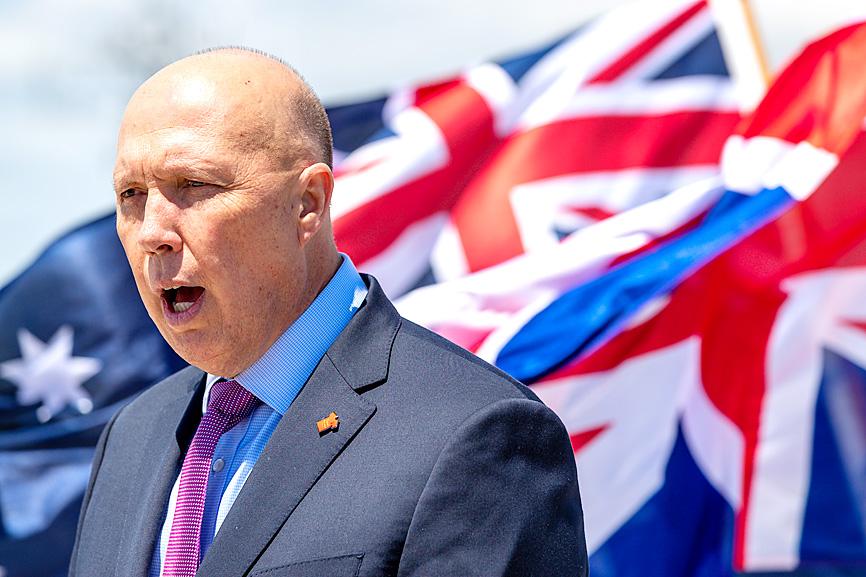It would be “inconceivable” for Australia not to join the US should Washington take action to defend Taiwan, Australian Minister of Defence Peter Dutton said yesterday.
US Secretary of State Antony Blinken on Wednesday said that the US and its allies would take unspecified “action” if China were to use force to alter the “status quo” over Taiwan.
“It would be inconceivable that we wouldn’t support the US in an action if the US chose to take that action,” Dutton told the Australian newspaper in an interview.
“And, again, I think we should be very frank and honest about that, look at all of the facts and circumstances without precommitting, and maybe there are circumstances where we wouldn’t take up that option, [but] I can’t conceive of those circumstances,” he said.
China’s military on Tuesday said it conducted a combat readiness patrol in the direction of the Taiwan Strait, after the Chinese Ministry of National Defense condemned a visit by a US congressional delegation to Taiwan.
China has “been very clear about their intent to go into Taiwan, and we need to make sure that there is a high level of preparedness, a greater sense of deterrence by our capability, and that is how I think we put our country in a position of strength,” Dutton told the newspaper.
US President Joe Biden is to hold a virtual meeting with Chinese President Xi Jinping (習近平) tomorrow, the White House has said, talks Washington hopes will create some stability amid increased tensions between the two nations.
Xi and Biden “will exchange views on China-US relations and issues of mutual interest,” Chinese Ministry of Foreign Affairs spokeswoman Hua Chunying (華春瑩) said in a statement.
Chinese Minister of Foreign Affairs Wang Yi (王毅) spoke to Blinken on Saturday, and urged both sides to prepare for a smooth meeting to ensure that relations are propelled back to a healthy level, a statement on the Chinese Ministry of Foreign Affairs Web site said.
Wang also told Blinken that the US should not send the wrong signals to Taiwanese pro-independence forces, the statement said.
“If the United States really wants to maintain peace in the Taiwan Strait, it should clearly and resolutely oppose any Taiwan pro-independence behavior,” Wang said.
Wang and Blinken also exchanged views on areas including energy efficiency, climate change and the Iran nuclear issue, and agreed to maintain dialogue on global challenges, China said.
Former US assistant secretary of state for East Asian and Pacific affairs Daniel Russel said both Biden and Xi are worried by the risk of a military incident escalating.
“Biden knows that the tools for prevention and crisis management are rusty, so we should expect him to push to put in place safeguards or ‘guardrails’ to reduce risk,” he said.
Russel said the Sept. 9 call between the presidents began with Xi listing complaints, but ended with a constructive agreement for officials to continue discussions.
“This suggests that the personal relationship Biden built with Xi a decade ago is still strong, and that each conversation can add some stability to the mix,” he said.
Additional reporting by Bloomberg
Source: Taipei Times - 2021/11/14





















